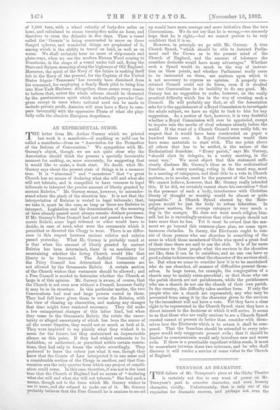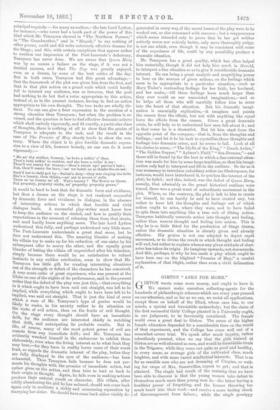TENNYSON AS DRAMATIST.
THE failure of Mr. Tenuyson's piece at the Globe Theatre is certainly not due to any want of power on Mr. Tennyson's part to conceive character, and even homely character, vividly. Unfortunately, that is only one of the requisites for dramatic success, and perhaps not even the principal requisite :—for many an author,—the late Lord Lytton, for instance,—who never had a tenth part of the power of this kind which Mr. Tennyson showed in "The Northern Farmer," in "The Grandmother," and in " Rizpah," to say nothing of other poems, could and did write extremely effective dramas for the Stage ; and this, with certain exceptions that appear rather to confirm our impression of the Poet-Laureate's deficiency, Tennyson has never done. We are aware that Queen Mary was by no means a failure on the stage, if it was not a decided success, and that The Cup was greatly enjoyed, even as a drama, by some of the best critics of the day.
But in both cases, Tennyson had this great advantage,— that the framework of the plot was given him from the first, and that in that plot action on a grand scale which could hardly fail to interest any audience, was so inwoven, that the poet had nothing to do but find a voice appropriate to this action, instead of, as in the present instance, having to find an action appropriate to his own thought. The two tasks are wholly dis- tinct. No one can give a finer expression to the emotion of a strong situation than Tennyson ; but when the problem is re- versed, and the question is how to find effective dramatic actions which shall embody vigorously, and fit exactly, a particular Class of thoughts, there is nothing at all to show that the genius of Tennyson is adequate to the task, and the result in the case of The Promise of May clearly tends to show the con- trary. Where the object is to give forcible dramatic expres- sion to a view of life, however homely, no one can do it more vigorously:— " Me an' thy =Aber, Sammy, 'as bean a talkin' o' thee. Thon's behn talkin' to mother, and she been a tellin' it me Thou Ii not marry for munny,—thou's sweet upo' parson's lass ; Nog, thou'll marry for luvv,—an' we botith on us thinks the, an ass.
Seell'd her to-daily goti by—Sahint's daily—they was ringing the WIN. She's a beauty, thou thinks,—an' soli is s000rs o' gulls,
Them as 'as 'nanny an' all. Wat's beauty F The flower as blaws. But proputty, proputty sticks, an' proputty, proputty graws."
It would be hard to beat that for dramatic force and vividness, but then a drama on the stage is not rendered successful by dramatic force and vividness in dialogue, in the absence of interesting actions to which that forcible and vivid dialogue leads. A successful play-writer must know how to keep the audience on the stretch, and how to gratify their expectations in the moment of releasing them from that strain, and need hardly know anything more. The late Lord Lytton understood this fully, and perhaps understood very little more. The Poet-Laureate understands a great deal more, but he does not understand this. The amazing blunder of making his villain try to make up for his seduction of one sister by his subsequent offer to marry the other, and the equally great blunder of letting the villain off unpunished after his detection, simply because there would be no satisfaction to refined instincts in any sudden retribution, seem to show that Mr. Tennyson has little gift for creating interesting situations out of the strength or defect of the characters he has conceived. A very acute critic of great experience, who was present at the Globe on one of the nights of its performance, said to the present writer that the defect of the play was just this,—that everything in it which ought to have been said out straight, was left to be implied, while everything which ought to have been left to be implied, was said out straight. That is just the kind of error which a man of Mr. Tennyson's type of genius would be likely to make, in his anxiety rather to fix attention on the roots of evil action, than on the fruits of evil thought. On the stage every thought should have an immediate drift, for the audience are interested chiefly in watching that drift, and anticipating its probable results. But in life, of course, many of the most potent germs of evil are remote from any immediate drift; and Mr. Tennyson has evidently wrecked himself in the endeavour to exhibit them elaborately, even when the living interest as to what fruit they may bear,—for they have in reality borne some of their worst fruit, as regards the dramatic interest of the play, before they are fully displayed to the eyes of the audience,—has been exhausted. Thus Tennyson fails because he does not per- meate his thoughts with the promise of immediate action, but rather gives us the action, and then tries to lead us back to their origin in thought. Again, he fails even in making actions produce their natural result on character. His villain, after coldly abandoning the girl he has seduced, should not come back again only to meditate a sickly and unmeaning reparation by marrying her sister. He should have come back either visibly dc- generated in every way, if the moral lesson of the play were to be worked out, or else consumed with remorse ; but a reappearance which seems intended only to prove that he has got neither actively worse nor actively better, only more thoroughly pulpy, is not one which, even though it may be consistent with some of the experience of life, could by any possibility produce a dramatic situation, Mr. Tennyson has a great quality, which has often helped him materially, though it did not help him much in Harold, to interpret a fine situation so as to give it considerable dramatic interest. He can bring a great analytic and magnifying power to bear on the sources of given actions, on the feelings which seem to be appropriate to a particular situation,—such as Mary Tudor's contending feelings for her faith, her husband, and her realm,—till these feelings loom much larger than they ever would on our unassisted imaginations,—and so he helps all those who will carefully follow him to enter into the heart of that situation. But his dramatic imagi- nation is essentially explicative,—it imagines and paints the causes from the effects, but not with anything like equal force the effects from the causes. Given a great dramatic crisis, he will help us to understand how men felt about it ; and in that sense he is a dramatist. But let him start from the opposite point of the compass,—that is, from the thoughts and feelings,—and let it be his task to crystallisethose thoughts and feelings into dramatic crises, and he seems to fail. Look at all his stories in verse,—" The Idylls of the King," "Enoch Arden," "The Golden Supper," " Aylmer's Field," "Sea-Dreams,"—and those will be found by far the best in which a fine external situa- tion was made for him by some large tradition, so that his imagi- nation only had to interpret and fill-in the outlines. So far as it was necessary to introduce subsidiary action (as Shakespeare, for instance, would have introduced it, to quicken the interest of the plot), he failed; and this, indeed, was the defect of Queen Mary, namely, that admirably as the grand historical outlines were traced, there was a great want of subordinate movement in the plot. Where, on the contrary, the plot is left to him to create for himself, he can hardly be said to have created any, but rather to have left the thoughts and feelings out of which action ought to arise, where they were, and to have failed to spin them into anything like a true web of fitting action. Tennyson habitually unravels action into thought and feeling, rather than weaves thought and feeling into action. This is why he is so little fitted for the production of Stage drama, unless the dramatic situation is already given and already effective. His genius is not one adapted to depict rapid movement, or to divine the result in which thought and feeling will end, but rather to explain whence any given attitude of char- acter has taken its origin. He imagines upwards, not downwards. And this, perhaps, is why he has made a play which ought to have been one on the blighted "Promise of May," a careful explanation of that blight, rather than even a vivid delineation of it.



































 Previous page
Previous page